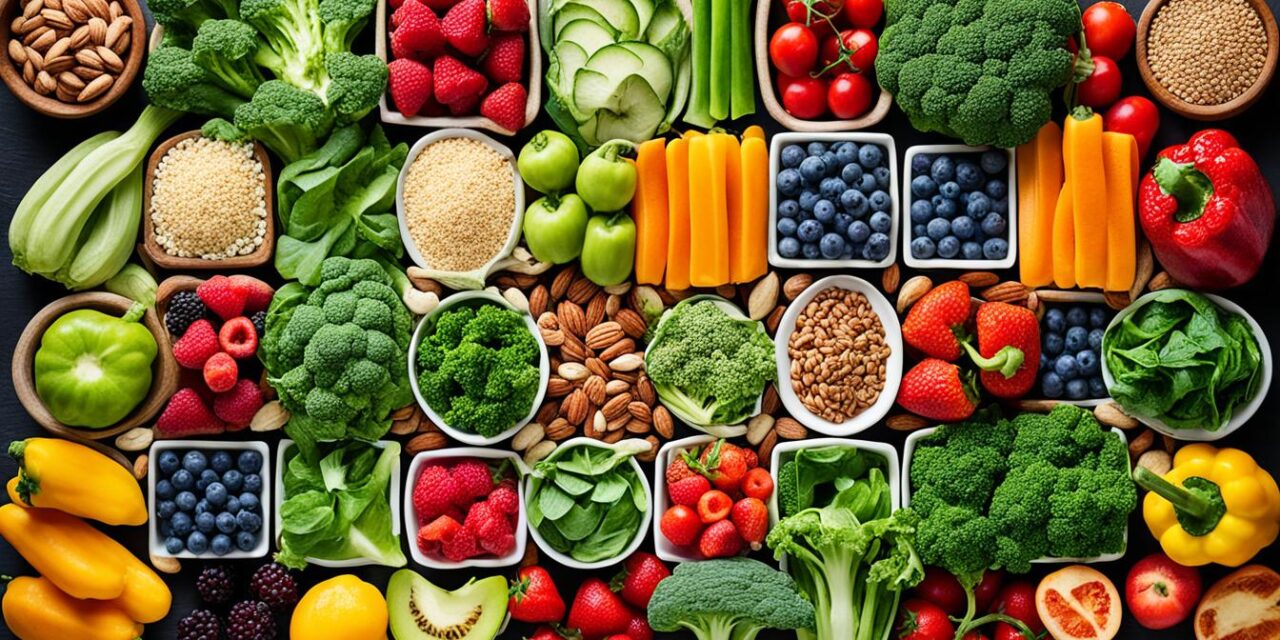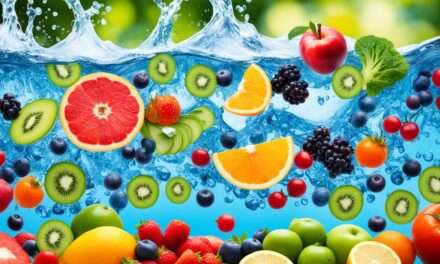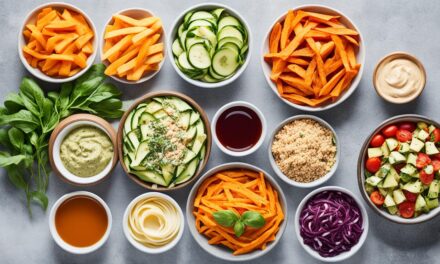Did you know that the food you eat can have a direct impact on your hormones? That’s right, your daily diet plays a crucial role in maintaining hormonal balance and keeping PMS symptoms at bay. By incorporating hormone-balancing foods into your meals, you can nourish your body and support overall women’s health.
From mood swings to hormonal imbalances, these issues can disrupt your daily life and leave you feeling frustrated. But fear not! There are natural remedies that can help regulate your hormones and alleviate PMS symptoms. And the best part? They can be found right in your kitchen!
So, if you’re ready to take control of your hormonal health, let’s dive into the world of hormone-balancing foods and discover how they can positively impact your well-being.
Key Takeaways:
- By incorporating hormone-balancing foods into your diet, you can promote hormonal balance and reduce PMS symptoms.
- Foods like watermelon, cucumber, kale, and spinach provide essential nutrients for menstrual health.
- Ginger and fish have anti-inflammatory properties and may help alleviate muscle pain and reduce period-related ailments.
- Drinking plenty of water during your period can help with hydration and reduce bloating.
- Consult with a healthcare professional to personalize your diet and find the best approach for your hormonal well-being.
Water
When it comes to your period, staying hydrated is essential. Not only does water keep you refreshed and energized, but it also plays a crucial role in reducing common discomforts like dehydration headaches, water retention, and bloating.
Drinking plenty of water during menstruation helps replenish lost fluids and maintains a healthy level of hydration. This is especially important as your body needs more water during this time to support the natural process of shedding the uterine lining.
“Water is the elixir of life, and during your period, it can be your best friend.”
Hydration is key in minimizing the risk of dehydration headaches, which can occur due to fluid loss during menstruation. By drinking enough water, you can keep those headaches at bay and ensure your body functions optimally.
| Benefits of Staying Hydrated During Your Period |
|---|
| Reduces the risk of dehydration headaches |
| Helps alleviate water retention |
| Minimizes bloating |
Water also aids in reducing water retention, a common symptom during menstruation that causes feelings of bloating and discomfort. By staying hydrated, you can help flush out excess fluids from your body and alleviate these unwelcome sensations.
Remember to sip on water throughout the day and listen to your body’s cues for hydration. If you’re unsure about how much water you should be drinking, consult with a healthcare professional for personalized advice.
Fruit
Looking for a sweet and juicy way to stay hydrated during your period? Look no further than water-rich fruits like watermelon and cucumber. These refreshing treats not only quench your thirst but also provide essential nutrients to support your overall well-being.
Did you know? Fruits are not only delicious but also help curb sugar cravings without causing those unpleasant glucose level spikes and crashes that can worsen PMS symptoms.
When you have sugar cravings during menstruation, reaching for a piece of fruit can be a healthier alternative. Fruits contain natural sugars that are broken down more slowly by your body, providing a steady release of energy without the sudden sugar spikes and subsequent crashes.
So, instead of indulging in processed snacks or sugary treats, try satisfying your sweet tooth with a juicy fruit. Not only will it help keep your glucose levels stable, but it will also provide you with essential vitamins and minerals that support your overall health.
Leafy Green Vegetables
When it comes to maintaining your iron levels and supporting a healthy menstrual flow, leafy green vegetables like kale and spinach are your ultimate allies. These vibrant greens pack a powerful punch of iron, helping to counteract the dip in iron levels often experienced during menstruation. Iron deficiency can lead to fatigue, bodily pain, and even dizziness, so incorporating leafy greens into your diet can help keep you feeling energized and vibrant.
Not only are they rich in iron, but leafy green vegetables also provide another crucial nutrient for menstrual health: magnesium. This mighty mineral is known for its ability to alleviate menstrual pain and mood swings. By including leafy greens in your meals, you can nourish your body with the essential nutrients it needs to combat those pesky period symptoms.
Health Benefits of Leafy Green Vegetables:
| Nutrient | Health Benefits |
|---|---|
| Iron | Counteracts iron deficiency and fatigue |
| Magnesium | Alleviates menstrual pain and mood swings |
Don’t let your menstrual cycle dampen your spirits. Embrace the power of leafy green vegetables to support your iron levels, menstrual flow, and overall well-being. Your body will thank you!
Ginger
When it comes to soothing muscle pain and reducing nausea, ginger is your best friend. This popular spice has been used for centuries due to its anti-inflammatory effects, making it an effective natural remedy. Whether you’re experiencing cramps or general muscle soreness during your period, ginger can provide much-needed relief.
You can enjoy ginger in various forms, including ginger tea. Sip on a warm cup of ginger tea to ease menstrual discomfort and calm your stomach. Ginger tea is particularly beneficial for relieving nausea, a common symptom experienced during menstruation.
While ginger shows promise in managing symptoms of menstruation, it’s important to note that more research is needed to fully understand its effectiveness. However, it’s worth incorporating this versatile herb into your diet to potentially alleviate muscle pain and combat feelings of nausea.
“Ginger has been used for centuries for its anti-inflammatory properties and natural pain-relieving effects. It’s no wonder it’s a popular choice for relieving muscle pain and reducing nausea during menstruation.” – Dr. Jane Richards
So why wait? Try adding ginger to your meals or sipping on ginger tea to experience its potential benefits. Not only will it help ease your muscle pain and nausea, but it also adds a delightful zing to your taste buds.
| Ginger | Benefits |
|---|---|
| Anti-inflammatory effects | Reduces muscle pain and inflammation |
| Nausea relief | Alleviates feelings of nausea |
| Versatility | Can be enjoyed in various forms, such as ginger tea |
Remember, ginger is just one of the many hormone-balancing foods you can incorporate into your diet to support your overall well-being during menstruation.
Fish
When it comes to finding a nutritious food that can benefit your menstrual health, look no further than fish. Not only is fish a delicious addition to your diet, but it also provides essential nutrients that can alleviate period pain, support your mental well-being, and promote a healthy menstrual flow.
One of the key nutrients found in fish is iron, which is particularly important during menstruation. Iron levels can dip during your period, leading to fatigue, weakness, and dizziness. By incorporating fish into your meals, you can boost your iron intake and help replenish your body’s stores, ensuring that you have the energy you need to get through your cycle.
Fish is also an excellent source of protein, which is essential for repairing and building tissues and supporting overall health. Protein-rich foods can help relieve menstrual symptoms by providing your body with the necessary building blocks for hormone regulation and tissue repair.
Another standout nutrient in fish is omega-3 fatty acids, which have been linked to a wide range of health benefits. These essential fatty acids can help reduce inflammation, alleviate period pain, and even improve symptoms of depression that may accompany menstruation.
So, whether you prefer salmon, trout, or sardines, consider adding fish to your menu during your period. Not only will it satisfy your taste buds, but it will also provide you with the iron, protein, and omega-3 fatty acids that your body needs for a smoother menstrual experience.
Did You Know?
In addition to their benefits for menstrual health, omega-3 fatty acids found in fish are also known to support heart health, brain function, and eye health. So, by enjoying a delicious fish dish, you’re not only taking care of your body during menstruation but also promoting overall well-being.
Conclusion
Congratulations! You’re now equipped with the knowledge of how to promote hormonal balance, reduce pesky PMS symptoms, and support your overall women’s health through the power of hormone-balancing foods. By incorporating these nutrient-rich ingredients into your diet, such as iron, protein, omega-3 fatty acids, and vitamins, you can tackle those mood swings and PMS symptoms head-on.
Remember, listening to your body is key. Pay attention to the signals it’s sending you and make mindful food choices accordingly. However, it’s essential to note that while hormone-balancing foods can have a positive impact on your menstrual cycle, it’s always a good idea to consult with a healthcare professional for personalized advice and guidance.
So, ladies, let’s embrace this delicious and empowering journey towards hormonal balance. Say goodbye to those annoying mood swings, pesky PMS symptoms, and welcome a healthier and happier you. Fuel your body with the right foods and let your menstrual cycle harmonize with your overall well-being. Your hormones will thank you!
FAQ
Does eating certain foods during my period help with mood swings and PMS symptoms?
How does drinking water impact my period?
Are there specific fruits that are beneficial during my period?
What nutrients do leafy green vegetables provide during menstruation?
Can ginger help with period symptoms?
Is fish a good addition to my diet during my period?
How can hormone-balancing foods affect my overall hormonal health?
MORE SOURCES TO READ:
- https://www.healthline.com/health/womens-health/what-to-eat-during-period
- https://sofreshnsogreen.com/recipes/eating-for-your-cycle/
- https://health.clevelandclinic.org/11-diet-changes-that-help-you-fight-pms
![]()














Recent Comments